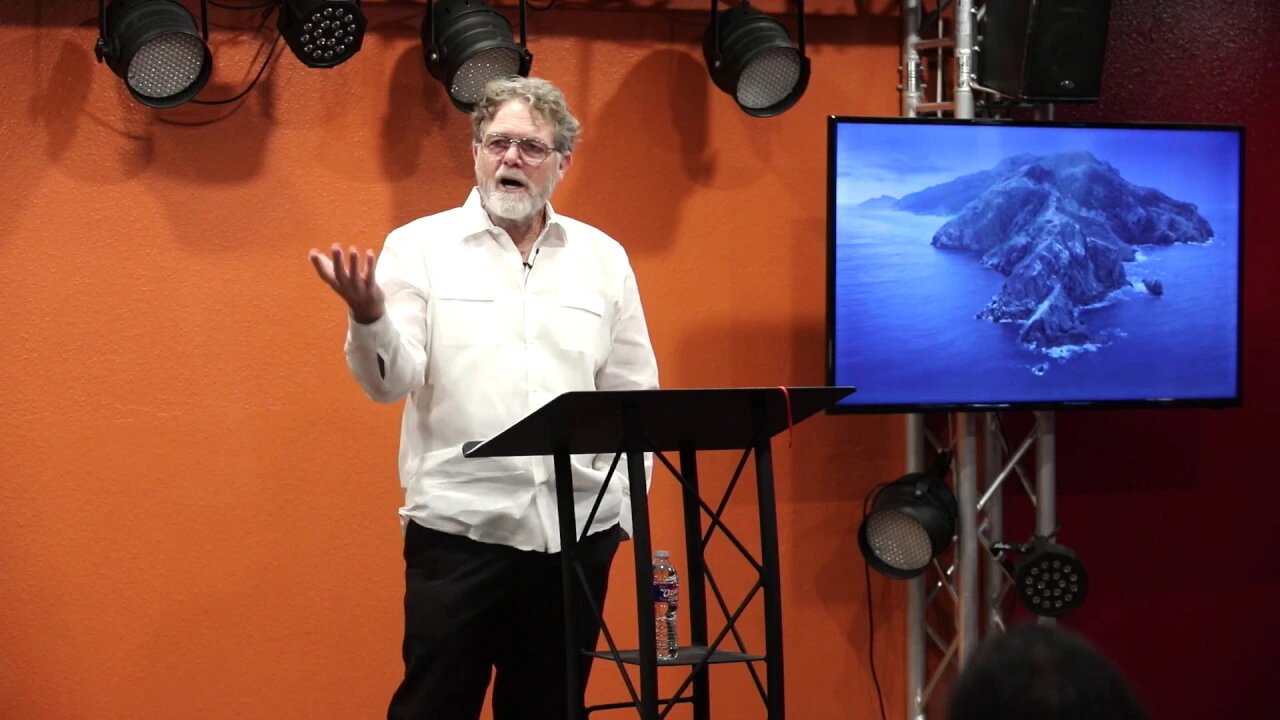Premium Only Content

THE OVEREMPHASIS OF TONGUES
Mike Balloun teaches on 11-30-2019.
THE OVEREMPHASIS OF TONGUES
2nd Timothy 2:15; Acts 1:45, 10:44-48. 11:15; 1st Corinthians 12:27-13:1,14:1-5,24-28
STUDY NOTES: https://www.dropbox.com/sh/qh07b98eum6dk4k/AABO8u6GGGor9XQjWF0f6IGIa?dl=0
AUDIO: https://www.dropbox.com/sh/mgps5r3xauwno3n/AADM_argwy7rKIrPTIZAU3GPa?dl=0
Subscribe to Receive Updates from For His Glory TX: http://eepurl.com/o7-J9
THE OVEREMPHASIS OF TONGUES AS EVIDENCE OF BEING FILLED WITH THE SPIRIT
“Give diligence to present thyself approved unto God, a workman that needeth not to be ashamed, handling aright the word of truth.” [2nd Timothy 2:15]
The first verse of prophecy mentioned by Peter in explanation of the supernatural events occurring at Pentecost 2000 years ago are found in Joel 2:23-32. This is the word of prophecy that is the basis for the “Spirit” infilling/baptizing movement doctrine on down to our time, and to the return of Jesus Christ. It is the prophecy that Jesus Christ the Lord began to fill with meaning, and it is what John 7:37-39 had in view.
It is understood from Scripture that to be born of the Spirit/spirit is one spiritual event while being baptized in the power of the Holy Spirit by Christ is another. The truth of this statement speaks to the command of Christ to His Disciples in Acts 1 that they should wait in Jerusalem “….for the promise of the Father, which, saith he, ye have heard of me. For John truly baptized with water; but ye shall be baptized with the Holy Ghost not many days hence.” [Acts 1:4-5]
That one may be born again but yet not be baptized in the Holy Spirit is also understood from Acts 8:16 with Paul’s encounter with disciples in Ephesus where he asked them “…..have you received the Holy Ghost since ye believed?” It grows apparent to the one interested enough to search the Scriptures that one may be a born-again believer and even be water baptized in the name of the Lord Jesus, and yet be without the Baptism of the Holy Spirit. Although the separate events may be very close in time, as seen with Cornelius and family in Acts 10:44-48. And that for at least for some decades after Pentecost, the Baptism of the Holy Spirit was still occurring. That it was recognizably the same as what was experienced at Pentecost 9-10 years prior, was proclaimed by Peter and the Jews who accompanied him to Cornelius’s house (Acts 11:15).
Now in all three of these previous examples (the Day of Pentecost, then 10 years or so later with the events at Cornelius’s house, and then about 14 years later with Paul’s encounter with the disciples at Ephesus), the Scriptures declare the Baptism of the Holy Spirit was accompanied by “tongues”. Now in these 3 cases it is evident that each time the Holy Spirit fell upon them, “tongues” was a sign that followed. But what is not clear and conclusive is that in each and every time before and after that, that all who are baptized in the Holy Spirit spoke in tongues as evidence to their infilling.
That tongues is not the only evidence or manifestation of the Baptism of the Holy Spirit is clearly understood from Paul’s teachings on this subject in 1st Corinthians chapters 12,13 &14. Additionally, tongues are not given the great preeminence or significance that the Pentecostal or Charismatic tongues movements would give it. Seemingly, it is even contrary as tongues is listed next to last on the list of manifestations of the Spirit, and listed first in being contrasted negatively to Love being the more excellent means by which the Holy Spirit is manifested in baptismal evidence of growing spirituality (read 1st Corinthians 12:27 - 13:1). Speaking in ‘tongues’ is discouraged if not forbidden as an edifying means of ministry in the Church gathering, unless accompanied by interpretation. Spiritual gifts are to be desired secondary to obediently following after the manifestation of the Spirit in love. And that since love seeketh not her own, Scripture exhorts to seek those gifts that edify, and exhort, and comfort others as opposed to seeking and speaking in tongues as it relates to Church ministry (read 1st Corinthians 14:1-5).
Now the question becomes: Is this Baptism of the Holy Spirit for today’s believer? And if so, is it the same? That the need for the Baptism of the Holy Spirit today just as it was then is hardly deniable. As to His manifesting, there are questions.
Cessationism verses Continuationism
Certainly many Christians believe Scripture declares the baptism of the Holy Spirit with gifts following continues just as it did on the Day of Pentecost, and will continue until “… when that which is perfect is come, then that which is in part shall be done away.” (1st Corinthians 13:10) That “…perfect…” to come is understood to mean (at the very soonest) at the Lord’s Return or (at the latest) after the Millennial Kingdom. Charismatics and Pentecostals fall......
DOWNLOAD COMPLETE STUDY NOTES: https://www.dropbox.com/sh/qh07b98eum6dk4k/AABO8u6GGGor9XQjWF0f6IGIa?dl=0
-
 1:58:09
1:58:09
For His Glory TX
13 days ago🔥 GENESIS CHAPTER 41 (VOLUME 6) | BASIC UNDERSTANDINGS OF SCRIPTURE FOR TRUTH (PART 44) 🔥
1351 -
 4:53:16
4:53:16
SynthTrax & DJ Cheezus Livestreams
1 day agoFriday Night Synthwave 80s 90s Electronica and more DJ MIX Livestream THE NEW MODEL - Variety Edition
57.9K10 -
 LIVE
LIVE
Anthony Rogers
1 day agoAnthony Rogers Show - 24/7 Stream
497 watching -
 2:11:55
2:11:55
Total Horse Channel
19 hours ago2025 CMSA Extravaganza | Mounted Shooting
58.3K3 -
 4:50:33
4:50:33
VapinGamers
10 hours ago $5.32 earnedGedonia 2 - Early Release Preview and Co-Stream! - !game #Sponsored
69.2K -
 1:32:39
1:32:39
Glenn Greenwald
15 hours agoWeek in Review: Trump's Tariffs, Ukraine Negotiations, Possibility of War with Iran, and More with Glenn Greenwald, Lee Fang, & Michael Tracey | SYSTEM UPDATE #438
151K70 -
 5:01:00
5:01:00
EnDuEnDo
9 hours ago🚨Vairety Stream 🎮 Push to 500 Followers 🚀 Chill Vibes 😎
32.5K1 -
 4:25:53
4:25:53
Nerdrotic
15 hours ago $40.78 earnedMarvel Is SCREWED | Daredevil Afterbirth | G20 is ABSOLUTE Cinema - Friday Night Tights 349 w MauLer
149K36 -
 56:03
56:03
BonginoReport
14 hours agoICE Boss Wants Deportations To Run like Amazon Prime - Nightly Scroll w/Hayley Caronia (Ep.25)
148K87 -
 45:12
45:12
Sarah Westall
12 hours ago“Most Important Story of the Decade” Globalists Move to Fund World Gov w/ Alex Newman & Sam Anthony
74.6K14